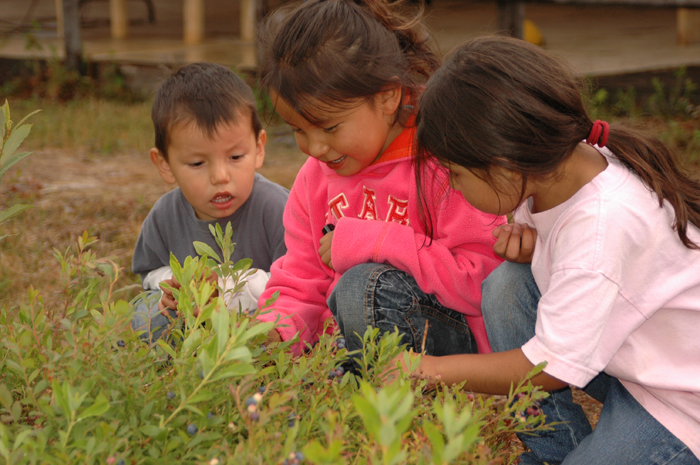Announcements
Top 10 2014 Stories: 4) First Nations Stewardship
Cree children picking wild blueberries in Quebec
Credit: Natasha Moine
Some of the most exciting boreal forest initiatives in 2013 were led by Aboriginal peoples, and the importance of their leadership is expected to increase in 2014. For hundreds of communities, the boreal forest continues to be their home and provides both their physical and spiritual sustenance. Conflicts over pipeline projects and resource development continue, but there is growing international and domestic recognition of the importance and value of Free, Prior, and Informed Consent as well as meaningful consultation and cooperation with Aboriginal communities.
Land-use plans developed by the Sahtu and Dehcho in the Northwest Territories, Inuit and Innu in Labrador, and many others have demonstrated how balance can be achieved between lands dedicated to conservation and lands available for carefully planned and managed development.
But as economic pressures build to extract natural resources from the boreal region, Aboriginal communities continue to find themselves on the front lines.
Indiscriminate opening of lands for development in regions like northeastern British Columbia has placed unprecedented pressures on Aboriginal communities. A recent report by the David Suzuki Foundation identified 16,267 oil and gas wells, 28,587 kilometres of pipeline, 45,293 kilometres of roads, and 116,725 kilometres of seismic lines packed into the Peace Region. If laid end-to-end, this infrastructure would wrap around the planet an astonishing four-and-a-half times. Yet, the province has no plan in place to manage the impacts of these developments.
Even where planning regimes are in place, challenges remain. In early November, the Supreme Court of Newfoundland and Labrador ruled that the provincial government had deliberately and unreasonably delayed progress on implementing a land-use plan with the Nunatsiavut Government to cover a 76,520-km² (7.6 million-hectare) agreement made in 2004. In Quebec, the Grand Council of the Crees is still awaiting a response from the Government of Quebec on their Broadback River Watershed conservation proposal, which would include more than 9,000 km² (900,000 hectares) of new protected lands.
Pending decisions on pipeline approvals not only in British Columbia but across the country will challenge the resolve of both governments and Aboriginal people to find constructive solutions to these challenging problems. It is clear is that the role of Aboriginal communities in determining the pace and scale of resource development will be an even bigger story in 2014, and that future health of the boreal—and successes in generating sustainable growth from resources—will depend on how well all sides are able to work together to resolve these issues.
Resources
View Slideshow »


